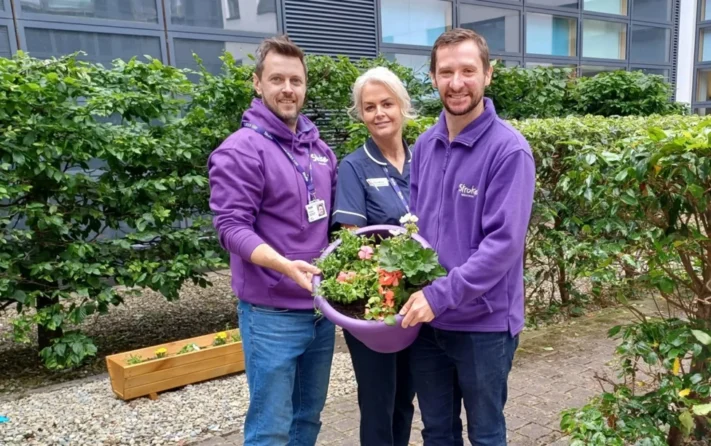
(Left to right) Craig Moore, from the Stroke Association, Ann-Marie McIlmoyle, Stroke Service Improvement Manager at Altnagelvin and Alasdair O’Hara, Northern Ireland Director at the Stroke Association
The tranquil space has wildlife-friendly flowers and garden benches to provide a space for stroke survivors and their loved ones to rest and connect away from the hospital ward during an inpatient stay.
Stroke Association volunteers from the region have also created a bespoke pottery piece for the garden.
In addition, new information displays have been unveiled in Altnagelvin Hospital.
The displays illustrate the experiences of stroke survivors from across the region and highlight how stroke survivors and their families can get vital support from the Stroke Association.
The displays are also already at other specialist stroke units across Northern Ireland.
Alasdair O’Hara, Northern Ireland Director at the Stroke Association, said: “Life after stroke can be daunting and we want to reach everyone as soon as possible with our support after their stroke.
“We’re delighted to be partnering with the team at Altnagelvin to introduce new artwork with information and advice about life after stroke and the new stroke garden.
“We hope that the garden can be a peaceful space for stroke survivors and their loved ones to connect, reflect and relax outdoors while they take those first steps in their life after stroke.
“We also want more people affected by stroke to know that we’re here to help and support them to live physically and mentally well in the aftermath of stroke.”
As Northern Ireland’s leading stroke specific charity, the Stroke Association is aiming to address a critical gap of currently reaching only 33% of stroke survivors in the UK to provide much-needed help, support and advice following their discharge from hospital. The charity provides communication and emotional wellbeing support services for stroke survivors across Northern Ireland.
Clodagh Dunlop MBE, from Magherafelt in Co Derry, suffered a brain stem stroke in 2015, which initially left her with locked-in syndrome.
She was completely paralysed and she was only able to communicate by using her eyes.
Clodagh loves gardening and believes that it has important life lessons for us all. She is also sharing her story as part of the art installation in Altnagelvin Hospital. She said:
“After spending time in intensive care and months in a hospital ward only able to move my eyelids, the first time I was brought in my wheelchair into a garden was very emotional but uplifting for me. To feel a cool breeze on my face after the stillness of the air in my hospital bed made me feel connected to the outside world again.
“Now in my ongoing recovery, I still find joy and peace in the garden. Gardening is accessible to all abilities – I now live with significant disabilities post stroke but with modifications and assistive tools I can enjoy gardening.
“Gardening has taught me patience, with the right care and time, plants will not only grow but thrive. The plants remind me of stroke survivors, with the right care, time and patience they too will begin to thrive again.”
Ann-Marie McIlmoyle, Stroke Service Improvement Manager at Altnagelvin Hospital said: “I am delighted our new garden, designed to help stroke patients recover, is officially open.
“Our Stroke Team has enjoyed working alongside Stroke Association colleagues and volunteers to support the development of the beautiful therapeutic garden, and we thank them for their ongoing commitment.
“This new space will bring immense physical and psychological benefits to our patients, giving them the opportunity to leave the clinical ward environment and enjoy the outdoors during their time in rehabilitation.”
The Stroke Association supports stroke survivors and their families by phone, at home, and in the community.
Tags:




